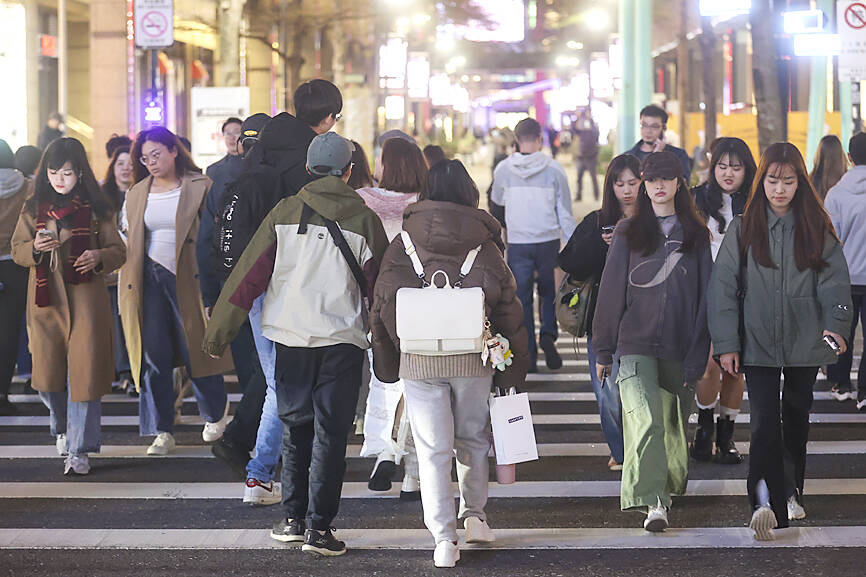Taiwan’s unemployment rate last month rose slightly to 3.34 percent, up 0.04 percent from January, as firms reduced temporary positions and some discontented workers moved on, the Directorate-General of Budget, Accounting and Statistics (DGBAS) said yesterday.
The latest data ended five consecutive months of decline, but reached the lowest level for the same month in 25 years, the agency said.
“The unemployment rate is expected to ease this month, as people who left their jobs have gradually found new positions,” Census Department Deputy Director Tan Wen-ling (譚文玲) said.

Photo: CNA
Tan attributed her forecast to improving labor participation rates, which climbed to a 36-year high of 59.33 percent last month, as more people, especially those aged 50 and older, re-entered the job market.
The government has encouraged older people to rejoin the workforce to enhance their financial standing and help ease labor shortages induced by Taiwan’s low birthrate.
The jobless rate after seasonal adjustments shed 0.02 percent to 3.35 percent, indicating a stable job market, Tan said.
The total number of people unemployed rose to 402,000, an increase of 6,000, or 1.39 percent, driven by 4,000 people who voluntarily left their jobs and services-oriented firms cutting temporary positions linked to the Lunar New Year holiday, the agency’s monthly report showed.
By education level, people with university degrees recorded the highest unemployment rate at 4.52 percent, followed by those with high-school or vocational-school education at 3.15 percent, it said.
Those with graduate degrees had an unemployment rate of 2.75 percent, while people who had completed only junior-high school or below had the lowest unemployment rate at 2.05 percent, it added.
Demographically, people between the ages of 20 and 24 had the highest unemployment rate, at 11.33 percent, followed by the 15 -to-19 age group, at 8.16 percent, and those aged 25 to 29, at 5.69 percent, the agency said.
People aged 35 and older had lower unemployment rates, ranging from 2.51 percent for those aged 35 to 39, to 2.2 percent for the 45-to-64 age group, it said.
The average unemployment period last month was 20.1 weeks, down 0.7 weeks from the previous month, while first-time jobseekers took an average of 21.7 weeks to secure employment, the agency said.
Tan said that a rising number of people aged 65 and older show an increasing willingness to return to the workforce as employers from different sectors become more accommodating of older people.
Still, underemployment worsened, rising to 7.58 percent, or 118,000 people, the agency found.
The sharp increase was largely due to unfavorable seasonality following the end of the Lunar New Year holiday, Tan said.

TAKING STOCK: A Taiwanese cookware firm in Vietnam urged customers to assess inventory or place orders early so shipments can reach the US while tariffs are paused Taiwanese businesses in Vietnam are exploring alternatives after the White House imposed a 46 percent import duty on Vietnamese goods, following US President Donald Trump’s announcement of “reciprocal” tariffs on the US’ trading partners. Lo Shih-liang (羅世良), chairman of Brico Industry Co (裕茂工業), a Taiwanese company that manufactures cast iron cookware and stove components in Vietnam, said that more than 40 percent of his business was tied to the US market, describing the constant US policy shifts as an emotional roller coaster. “I work during the day and stay up all night watching the news. I’ve been following US news until 3am

Six years ago, LVMH’s billionaire CEO Bernard Arnault and US President Donald Trump cut the blue ribbon on a factory in rural Texas that would make designer handbags for Louis Vuitton, one of the world’s best-known luxury brands. However, since the high-profile opening, the factory has faced a host of problems limiting production, 11 former Louis Vuitton employees said. The site has consistently ranked among the worst-performing for Louis Vuitton globally, “significantly” underperforming other facilities, said three former Louis Vuitton workers and a senior industry source, who cited internal rankings shared with staff. The plant’s problems — which have not

TARIFF CONCERNS: The chipmaker cited global uncertainty from US tariffs and a weakening economic outlook, but said its Singapore expansion remains on track Vanguard International Semiconductor Corp (世界先進), a foundry service provider specializing in producing power management and display driver chips, yesterday withdrew its full-year revenue projection of moderate growth for this year, as escalating US tariff tensions raised uncertainty and concern about a potential economic recession. The Hsinchu-based chipmaker in February said revenues this year would grow mildly from last year based on improving supply chain inventory levels and market demand. At the time, it also anticipated gradual quarter revenue growth. However, the US’ sweeping tariff policy has upended the industry’s supply chains and weakened economic prospects for the world economy, it said. “Now

COLLABORATION: Given Taiwan’s key position in global supply chains, the US firm is discussing strategies with local partners and clients to deal with global uncertainties Advanced Micro Devices Inc (AMD) yesterday said it is meeting with local ecosystem partners, including Taiwan Semiconductor Manufacturing Co (TSMC, 台積電), to discuss strategies, including long-term manufacturing, to navigate uncertainties such as US tariffs, as Taiwan occupies an important position in global supply chains. AMD chief executive officer Lisa Su (蘇姿丰) told reporters that Taiwan is an important part of the chip designer’s ecosystem and she is discussing with partners and customers in Taiwan to forge strong collaborations on different areas during this critical period. AMD has just become the first artificial-intelligence (AI) server chip customer of TSMC to utilize its advanced